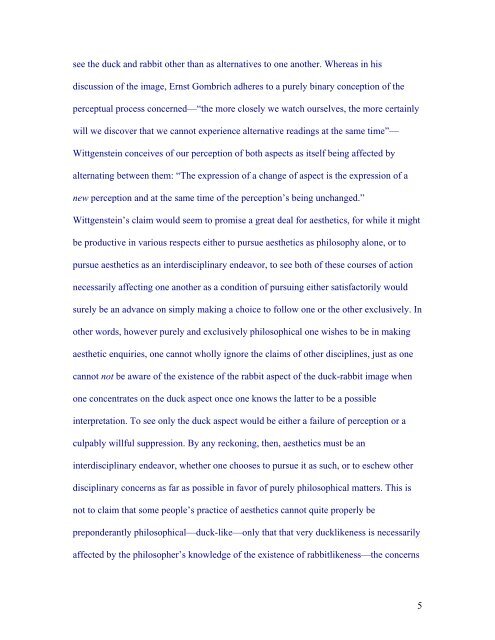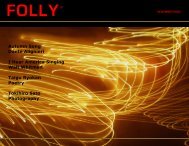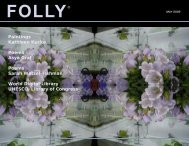1 Interdisciplinary Aesthetics Ivan Gaskell Is aesthetics a ... - Folly
1 Interdisciplinary Aesthetics Ivan Gaskell Is aesthetics a ... - Folly
1 Interdisciplinary Aesthetics Ivan Gaskell Is aesthetics a ... - Folly
Create successful ePaper yourself
Turn your PDF publications into a flip-book with our unique Google optimized e-Paper software.
see the duck and rabbit other than as alternatives to one another. Whereas in his<br />
discussion of the image, Ernst Gombrich adheres to a purely binary conception of the<br />
perceptual process concerned—“the more closely we watch ourselves, the more certainly<br />
will we discover that we cannot experience alternative readings at the same time”—<br />
Wittgenstein conceives of our perception of both aspects as itself being affected by<br />
alternating between them: “The expression of a change of aspect is the expression of a<br />
new perception and at the same time of the perception’s being unchanged.”<br />
Wittgenstein’s claim would seem to promise a great deal for <strong>aesthetics</strong>, for while it might<br />
be productive in various respects either to pursue <strong>aesthetics</strong> as philosophy alone, or to<br />
pursue <strong>aesthetics</strong> as an interdisciplinary endeavor, to see both of these courses of action<br />
necessarily affecting one another as a condition of pursuing either satisfactorily would<br />
surely be an advance on simply making a choice to follow one or the other exclusively. In<br />
other words, however purely and exclusively philosophical one wishes to be in making<br />
aesthetic enquiries, one cannot wholly ignore the claims of other disciplines, just as one<br />
cannot not be aware of the existence of the rabbit aspect of the duck-rabbit image when<br />
one concentrates on the duck aspect once one knows the latter to be a possible<br />
interpretation. To see only the duck aspect would be either a failure of perception or a<br />
culpably willful suppression. By any reckoning, then, <strong>aesthetics</strong> must be an<br />
interdisciplinary endeavor, whether one chooses to pursue it as such, or to eschew other<br />
disciplinary concerns as far as possible in favor of purely philosophical matters. This is<br />
not to claim that some people’s practice of <strong>aesthetics</strong> cannot quite properly be<br />
preponderantly philosophical—duck-like—only that that very ducklikeness is necessarily<br />
affected by the philosopher’s knowledge of the existence of rabbitlikeness—the concerns<br />
5




